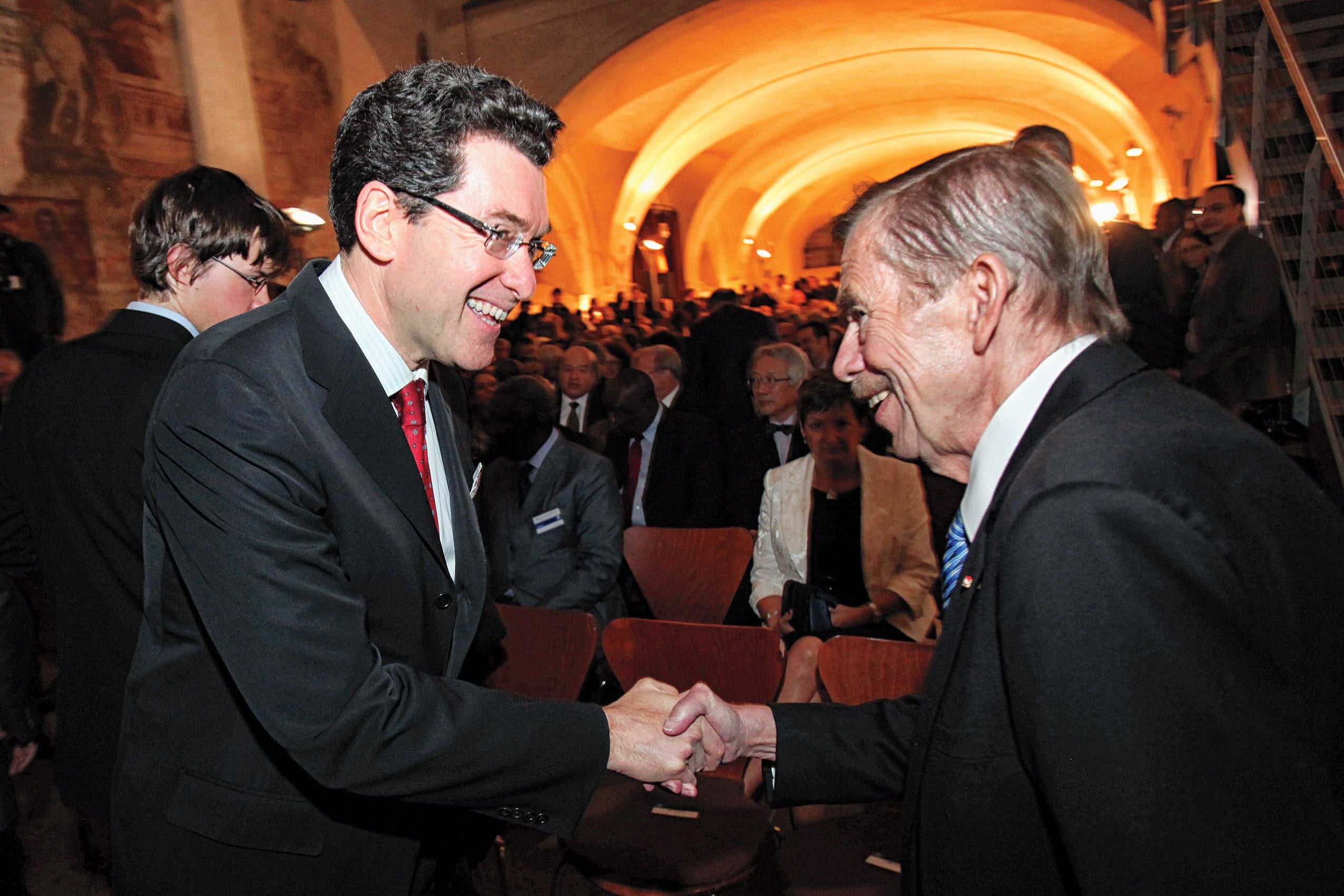Seven years ago, as the new U.S. ambassador to the Czech Republic, Norman Eisen ’91 moved into one of Prague’s most beautiful homes, a 150-plus-room Beaux-Arts mansion with a sweeping, curved façade. He soon heard fascinating tales about its previous residents: former ambassadors, a German general, and one of 1920s Czechoslovakia’s richest men. After his ambassadorship, Eisen turned to those stories to explore democracy’s epic battles with fascism and Communism. “I wanted to cover the ups and downs of the last 100 years of the liberal project, from Woodrow Wilson to World War II, the Marshall Plan, and the end of the Cold War,” Eisen says. “But I didn’t want to do it in an abstract way.”
The result, Eisen’s book “The Last Palace: Europe’s Turbulent Century in Five Lives and One Legendary House,” tells the story of the rise, fall, and rebirth of democracy in Prague through the lives of those who called the U.S. ambassador’s residence home, including former child-actor-turned-diplomat Shirley Temple Black. To represent the lives of ordinary Czechs, Eisen also writes about his mother, Frieda Eisen, an Auschwitz survivor and refugee from Communism. Though she never returned to her homeland, the book recounts their conversations during her son’s ambassadorship, as her pessimistic view of history challenged his optimism.
Eisen’s book, released in September, has won acclaim for its storytelling and for its resonance today, as illiberal movements grow in Europe and the United States.
“My experience in Prague, seeing illiberal forces gathering steam in the post-Cold War era, was one of my inspirations to write the book,” Eisen says. “Whenever you have a great surge of democracy, like we did in the post-1989 period, the counterattack will come, but its defeat is also likely.”
A senior fellow at the Brookings Institution, Eisen is a CNN commentator specializing in corruption, scandal and crime. Chair of Citizens for Responsibility and Ethics in Washington, he’s working with Harvard Law School Professor Laurence Tribe ’66 on legal challenges to President Trump under the Constitution’s foreign emoluments clause. His second book, in progress, will argue that Trump is undermining the rule of law. “If we fight—and that’s a big if—democracy is always stronger than illiberalism,” Eisen says.
In “The Last Palace,” the ambassador’s residence becomes a metaphor for Western democracy and the internationalism of the man who had it built: Otto Petschek, a coal mine owner with a love of artistry and architecture. “Although he was one of the richest men in the new Czechoslovakia,” says Eisen, “he was intensely private, and he transmitted that privacy down through the generations.” But while ambassador, Eisen gained the trust of Petschek’s relatives, who shared memories of Petschek and the house and opened the family archives. They even showed Eisen love letters between Petschek and his wife, Martha. “It was even better than being able to interview him,” says Eisen, “because they wrote each other several times a day.”
Though Petschek died in 1934, his story foreshadows Czechoslovakia’s dark days to come. He was Jewish and conservative, a believer in Czech democracy. As he perfected his mansion, both Communist and anti-Semitic propaganda targeted him.
During the Nazi occupation, Petschek’s commandeered mansion became the residence of German Gen. Rudolf Toussaint. A career Wehrmacht officer, Toussaint evaded a Nazi order to take part in the massacre in the Czech town of Lidice. On the war’s last day, he defied the SS by agreeing to a cease-fire that spared Prague further destruction.
“Toussaint is a very complicated man who often tried to do the right thing,” says Eisen. “His fundamental flaw was that he chose to remain complicit, and then was drawn into further complicity, with as evil a regime as the world has ever known,” he adds. “There’s a lesson there, by the way. You cannot dwell in the fire without being burned, and being responsible for others who are consumed by it.”
Eisen’s mother died in 2012. If she were alive today, “I suspect she would be less sanguine than I am about America’s ability to fight its way through,” Eisen says. “But I feel quite confident we’re going to do that.”
